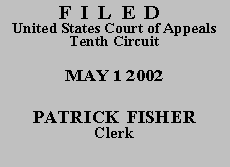

| HENRY MADRID, also known as
Enrique Madrid; JUANITA MADRID,
Petitioners - Appellants, v. COMMISSIONER OF INTERNAL REVENUE, Respondent - Appellee. |
|
Taxpayers Henry and Juanita Madrid, proceeding pro se, appeal an order of the United States Tax Court entering a stipulated decision establishing their income tax deficiencies. We exercise jurisdiction under I.R.C. § 7482(a)(1) and affirm.
The IRS issued a notice of deficiency on November 15, 1996, for the Madrids' 1990 and 1991 federal income taxes. The Madrids filed a petition in the Tax Court contesting the IRS's deficiency determination. They also sought discovery of numerous documents which the government had seized in connection with a criminal money-laundering case against Mr. Madrid.
By May 24, 1999, the date of a calendar call in Tax Court, not all requested documents had been located and returned to the Madrids. The parties, however, had reached an agreement stating that the Madrids owed an increased tax of $59,187 for tax years 1990 and 1991 and that Mr. Madrid owed $22,195 in fraud penalties, pursuant to I.R.C. § 6663. The amount was $22,195 less than the original amount sought by the IRS, with the reduction attributable to IRS concessions with regard to fraud penalties. During their negotiations, the parties also discussed the potential for the Madrids' submitting an offer in compromise, to be processed in accordance with I.R.C. § 7122, the statute governing the compromise of cases arising under the internal revenue laws.
Prompted by the Tax Court, the parties conducted further settlement talks on the day of calendar call. On the record, the parties agreed to sign and lodge with the court a stipulated decision reflecting the agreed-upon adjusted liability. If the government did not accept Madrids' proposed offer in compromise, then the stipulated decision would be entered.
The Madrids then submitted their offer in compromise to the IRS. In the offer, they did not contest the amount owed. Instead, they asserted that they had insufficient resources to pay the full amount and proposed settling their liability with a lump-sum payment of a lesser amount. The offer was rejected and the Madrids' administrative appeal of that rejection was denied.
Subsequently, the IRS moved for entry of the stipulated decision. The Madrids objected, asserting that they had located a document showing error in the IRS's calculation of their 1990 and 1991 income. The Tax Court overruled the objection and entered the stipulated decision which, as previously stated, assessed deficiencies in income tax due from both Madrids and penalties due from Mr. Madrid. In this court, the Madrids contend that the stipulation was not enforceable because they withdrew their consent before entry of the Tax Court decision.
"A trial court has the power to summarily enforce a settlement agreement entered into by the litigants while the litigation is pending before it." United States v. Hardage, 982 F.2d 1491, 1496 (10th Cir. 1993). We review the order enforcing a settlement for an abuse of discretion. See id. at 1495.
Generally, taxpayers consenting to an entry of judgment waive the right to appeal unless they can show that the court entering the judgment lacked jurisdiction to do so or that the consent was not voluntary. See Farrell v. Commissioner, 136 F.3d 889, 896 (2d Cir. 1998); White v. Commissioner, 776 F.2d 976, 977 (11th Cir. 1985); Tapper v. Commissioner, 766 F.2d 401, 403 (9th Cir. 1985); see also Tax Ct. R. 91(e) (stating that a stipulation constitutes "a conclusive admission" which the court will not allow a party "to qualify, change, or contradict" except "where justice requires"). The Tenth Circuit has recognized this principle in a related context. See United States v. Star Constr. Co., 186 F.2d 666, 669 (10th Cir. 1951) (rejecting the government's appellate challenge to an agreed-upon tax-credit amount because "[a] party is not aggrieved by a ruling regularly made, with his express or implied consent").
Neither exception to appellate waiver applies here. The Madrids do not question the jurisdiction of the Tax Court to enter the judgment. The transcript of the calendar-call proceedings demonstrates that the Madrids knowingly and voluntarily signed the stipulated decision. Despite their initial misgivings, the Madrids agreed to the stipulation on the record. We note that they received a benefit from their bargain, in that the I.R.S. conceded half of the fraud penalties against Mr. Madrid. Moreover, our review of the record, including the document located after the Madrids entered into the agreement, reveals no evidence of any condition that would render enforcement of the stipulated decision manifestly unjust.
Accordingly, the Tax Court did not abuse its discretion by entering the stipulated decision. The judgment of the Tax Court is AFFIRMED.
Entered for the Court
Circuit Judge
*. This order and judgment is not binding precedent, except under the doctrines of law of the case, res judicata, and collateral estoppel. The court generally disfavors the citation of orders and judgments; nevertheless, an order and judgment may be cited under the terms and conditions of 10th Cir. R. 36.3.